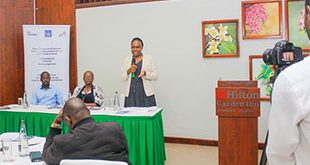
Kampala, Uganda | THE INDEPENDENT | A study on the digital economy in Uganda shows that only 26% of Ugandans are included and the rest are largely left out of the digital-aided services and economic activities. This is mainly because of the low penetration of digital-aided communication gadgets, the smartphone, but also the high cost of the internet.
This is according to a study carried out by Inclusive Digital Economy Scorecard, (IDES-Uganda)
The report provides an overview of the development and inclusiveness of the digital economy based on data collected up to the end of May 2021. It shows that Uganda has invested significant amounts of money in developing ICT in the country, but there is a lack of coordination between the government policies and the aspirations of the private sector.
“Innovation communities have been built, and there is an increasing number of innovation hubs in Uganda, which is a strong indicator of the take-up of an innovative culture.
However, their success or impact has not been researched yet, making this a key point of action if the entrepreneurs are to be given informed guidance,” says the report.
It adds that this emphasizes the observation that Uganda is performing well in terms of making policies, but still has a hard time implementing those policies to generate the expected impact of ICT on the economy and citizens.
The Permanent Secretary, Ministry of ICT and National Guidance, Aminah Zawedde agrees that much as there are fairly adequate policies, they have not translated into an equivalent impact on the people and the economy.
“The IDES shows that while Uganda has a strong digital policy and regulatory environment at 77%, the scores on infrastructure, skills, innovation and inclusiveness are still considerably low,” she says.
The lead consultant IDES Uganda, Dr Francis Frederick Tusubira says while there is good coverage in the city centres, the situation is quite different outside, and the cost is significantly higher.
“There is a de facto duopoly in Uganda, with usage costs relative to income being well above what is considered affordable, especially in rural areas. Uganda has just removed the regressive tax for access to over-the-top services but at the same time, it has a VAT of 18%, a 2% levy and has introduced a 12 percent excise duty on data though this does not include educational institutions,” he said.
Tusubira says if Uganda is to truly see the benefits of the digital economy, the main focus should be on the cost of data, including the taxes.
Tusubira warns that unless more effort is put in, Uganda might lag behind more countries, yet it was a pioneer in many aspects.
The State Minister for ICT, Godfrey Kabbyanga faulted the government agencies for failing to harmonise their operations in a way that would reduce the cost of digital services. He noted for example that the National ID is one of the most important primary documents, helping in the registration of SIM cards, while a SIM card is needed for access to mobile money services.
The other issue cited in the report is the basic literacy of Ugandans which is still low. “While basic money transfer and payment functions can be handled with even basic reading and writing, literacy as they use a step-by-step approach, more advanced skills are required for more advanced applications, for example, online operations for small and micro-enterprises,” says the report.
The UNICEF Annual Report 2019 states, “Less than half of the children are literate at the end of primary school. In secondary school, only 15 percent of students are proficient in biology, 43 percent in English and 47 percent in maths.”
Experts say this is a bad situation compared to other countries at Uganda’s level of development. “This strong statement sums up the state of education in Uganda and specifically points to a weak basic skills base. The digital literacy score is even lower at 20 percent. Up to now, the absence in Uganda of a holistic inclusion of digital skills in the education curricula from the lowest levels up to and including higher education institutions has created deficiencies that are difficult to address,” says Dr Tusubira.
The Director e-Government at NITA-U, Collins Babirukamu says that some of their programs were disrupted by the Covid-19 pandemic, citing the facilities that had been installed in schools and are now idle.
He says they have so far laid 4,000 kilometres of fibre connection and are expected to do another 3,000 in the next year but admits that most of this is along highways, leaving most of the country not served.
*****
URN
 The Independent Uganda: You get the Truth we Pay the Price
The Independent Uganda: You get the Truth we Pay the Price



